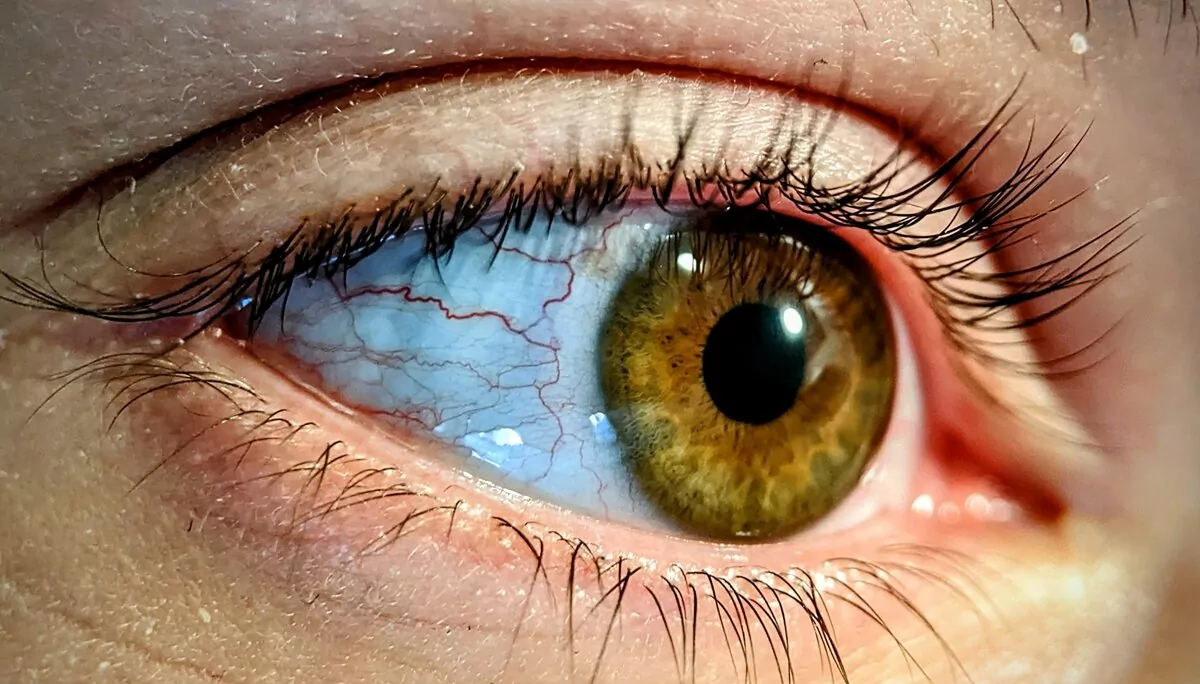Accidentally rubbing your eyes after handling chilli peppers can lead to a painful and alarming experience. The fiery compounds that give chillies their heat, when coming into contact with your eyes, can cause intense burning and discomfort. Many people worry about the long-term effects of such an encounter. Can this spicy mishap cause lasting damage, or even blindness? In this article, we delve into the burning questions surrounding chilli pepper exposure and eye health, equipping you with the knowledge to protect your vision from these potent plants.
On this page:
Understanding Capsaicin in Eye Reactions
The primary component of chilli that causes the burning sensation is capsaicin. This chemical activates the same receptors on eye tissues that are responsible for detecting heat and pain, sending signals to the brain that something is irritating the eye.
In response to capsaicin exposure, the eyes react with a series of reflexes. First, the blood vessels in the eyes dilate in an effort to flush out the irritant. This can lead to redness, a common symptom following chilli exposure. Next, the eyes begin to produce tears at an increased rate. These tears are not just water; they contain enzymes and antibodies that help protect the eye from bacteria and help to wash away foreign substances.
The eye’s protective reflexes cause rapid blinking which also aids in the removal of the irritant. The eyelids work as natural barriers, closing to reduce the amount of irritant that can enter the eye and helping to remove the substance through movement.
However, the cornea – the clear front surface of the eye – is particularly sensitive. Capsaicin can cause a stinging or burning pain here, which is why the sensation can be so intense. It is not the chili itself but the body’s reaction to the capsaicin in the chili that creates the discomfort and potential for damage.
The pain and discomfort are usually temporary, as the eye’s natural defense systems are quite effective at mitigating the effects of foreign substances. However, the severity of the reaction can vary depending on the amount and type of chili exposure, and the individual’s sensitivity.
Immediate Steps to Take After Chilli Juice in Eye Contact
Despite the discomfort, panicking may worsen the situation. Instead, blinking rapidly could help to increase tear production, aiding in the removal of chilli particles. Running cool water over the eyes for several minutes is a common and effective response when experiencing capsaicin in eye; however, it’s important not to use high-pressure water as it may cause further irritation.

Contact lenses, if worn, should be removed promptly to prevent trapped capsaicin—the compound responsible for the burning sensation—from causing extended discomfort. For those wearing glasses, it’s still crucial to rinse the eyes thoroughly.
Milk or a dairy-based product can be a soothing alternative to water because it contains casein, which helps to wash away the oily capsaicin. Soak a clean cloth in cold milk and gently apply it over closed eyes or pour milk into a cup and submerge open eyes for relief. It’s advisable to use this method only after initial flushing with water to avoid potential infection.
Refrain from rubbing the eyes as this can spread the capsaicin and exacerbate the pain. If the burning sensation persists after these initial steps, seeking medical advice is recommended to ensure the irritant has been completely removed and to obtain appropriate treatment to alleviate any remaining discomfort.
Medical Insights: Can Chilli in the Eyes Make You Blind
The active component in chilli peppers, capsaicin, can indeed cause intense pain, redness, and inflammation when it comes into contact with the eyes, but these effects are typically temporary. The cornea, which is the clear front part of the eye, has pain receptors that react severely to capsaicin, triggering a burning sensation.
However, it’s important to understand that the cornea has remarkable healing abilities. In most cases, even if the burn seems severe, the eye can repair itself over time. So, can chilli in the eyes make you blind? Permanent damage to the eyes from chilli is extremely rare and usually would involve an underlying eye condition or a particularly large amount of capsaicin exposure.
In the event of chilli pepper exposure, the body’s natural defense mechanisms, such as tearing and blinking, kick in to dilute and flush out the irritant. While these reactions can be uncomfortable and distressing, they are part of the healing process.
It is vital, however, to seek medical attention if the pain persists or if there is severe discomfort, as complications like corneal abrasions could occur if the eyes are rubbed vigorously. This could increase the risk of an infection or potentially cause damage that might require medical treatment.
Proven Remedies to Mitigate the Burn of Chilli in the Eyes
Rinsing the eyes with cool water is often the first and most accessible remedy. A gentle stream can help to flush out the capsaicin—the compound responsible for the heat in chillies—limiting its irritating effect on the eyes’ sensitive tissues.
If water alone doesn’t provide relief, saline solution, commonly used for contact lenses, can act as a more specialized flushing agent. Its composition closely mimics natural tears, which helps to soothe the eyes and restore their normal pH balance. Drip the saline into the eyes several times or until the burning sensation begins to subside.
Blinking rapidly is another natural response that can assist in mitigating the discomfort. This action promotes the production of tears, which can help to dilute and wash away the irritating substances. While the initial impulse might be to rub the eyes, this should be avoided, as it can exacerbate the pain and potentially cause more harm.
For persistent burning, a cold compress can offer some relief. Applying a clean, damp cloth that’s been chilled in the refrigerator—not frozen—to the closed eyelids may reduce inflammation and alleviate some of the burning sensations. The cool temperature has a numbing effect, which can provide a temporary respite from the pain.
Milk has also been cited as a home remedy due to its fat content, which can help to dissolve capsaicin. Soaking a cotton pad in cold milk and gently applying it to the closed eyelids could help in breaking down the capsaicin and offer relief. However, it should be noted that this method isn’t medically endorsed and should be approached with caution.
Prevention Tips: Keeping Spice Away from Your Sight
One effective strategy is to always wear gloves while cutting or handling chili peppers. This barrier between the skin and the chili oils can help prevent residue from getting onto the fingers, which could then be accidentally transferred to the eyes.

It’s advisable to clean kitchen utensils, cutting boards, and surfaces to prevent incidents like getting chilli juice in eye. Wash these items immediately after they come into contact with chili peppers to eliminate any lingering capsaicin, which is the compound that makes chili peppers hot. By doing so, the risk of inadvertently rubbing spicy residue into the eyes later is reduced.
Another important preventive measure is to avoid touching the face altogether while cooking with chili peppers. If there’s a need to touch the face for any reason, such as to adjust glasses or to scratch an itch, it’s crucial to wash hands thoroughly first. Soap and water can help remove the chili oils from the skin, but it might take a few washes to fully get rid of the burning substance.
For those wearing contact lenses, consider putting them in before handling chili peppers, or better yet, opt for glasses during cooking sessions involving spicy ingredients. Contact lenses can trap capsaicin against the eyes, potentially leading to a more intense burning sensation.
Keeping the kitchen well-ventilated can also help. This ensures that any aerosolized capsaicin, which can occur when cooking with chili peppers, doesn’t linger in the air and irritate the eyes.
Myths and Facts About Chilli and Eye Health
A prevalent myth suggests that getting chilli in your eyes can lead to permanent blindness. While it’s true that the capsaicin in chilli peppers causes a burning sensation, it does not have the capacity to cause complete and irreversible loss of vision. The pain and discomfort you feel are due to capsaicin’s irritating effect on the sensitive mucous membranes in your eyes, not because it’s inflicting physical damage to your eye structures.
Another myth is that milk is the best and only solution to counteract the burn. While milk can help soothe the burn because it contains casein, which helps to break down capsaicin, it’s not the only remedy. Plenty of clean water or saline solution can also be effective in flushing out the irritant.
Some believe that if you’ve handled chillies, your hands are forever tainted and will always cause eye irritation. This isn’t entirely true. Washing your hands thoroughly with soap and water, and perhaps using oils or alcohol-based solutions, can remove capsaicin residues from your skin, reducing the risk of accidentally transferring it to your eyes or other sensitive areas.
There’s a misconception that the effects of chilli exposure to the eyes are always immediate. This is not always the case. Sometimes, it takes a few moments for the capsaicin to react with the skin and mucous membranes. So, if you’ve touched your eyes after handling chilli and don’t feel an immediate sting, it doesn’t mean you’re out of the woods just yet.
Clearing the Air on Chilli-Induced Blindness
In wrapping up, we’ve sliced through the heat of the topic: can chilli cause blindness? It’s clear that while chilli in the eyes is no walk in the park, it’s unlikely to cause permanent vision loss when treated promptly and properly. The key takeaway is to act fast with the right remedies and keep those fiery peppers at a safe distance from your eyes. With a good rinse and appropriate care, your eyes should bounce back from the sting. Remember, if the pain persists or you’re worried about your eye health, seek professional medical advice. The answer to our burning question is reassuring—chilli may lead to temporary discomfort, but blindness is not on the menu.
